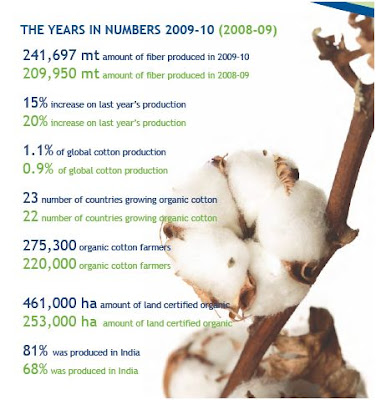Getting Better At Growing Cotton
The appetite for Cotton and cotton's own appetite for water, pesticides and fertilizers in the face of aggressive farming practices are inevitably driving cotton growing regions into degraded farm lands. Inextricably linked to cotton has been the health and financial well being of those who grow it when they faced with a crop that demands higher and higher inputs. But there was the other way, the better way and today entities such as WWF-India are working hard to change and to document the change that comes with it.
Last year, as a part of the project ‘Cotton in India - Challenges and Opportunities to Implement Better Cotton’, WWF-India developed Better Management Practices (BMPs) that would help farmers produce sustainable cotton. The Better Management Practices help farmers produce more sustainable cotton that reduce costs, increase crop yields, minimize health risks and environmental damage. These practices include reducing the use of chemical fertilizers and pesticides (that lead to long-term illnesses for the farmers and their families) along with better and more efficient use of natural resources, such as water and nutrients.
These practices include:
Better Water Management Practices
Cotton is a very thirsty crop which consumes a lot more water than we would like to believe. Therefore a better method of irrigation is the need of the hour. When Appasaheb Shere, a young farmer from Jalna district in Maharashtra switched from conventional flood method of irrigation to drip irrigation for his cotton crop, little did he know about the great results he was about to see.
He says “Earlier, when I used the flood method of irrigation, I used to get 25 quintals of yield from 4.5 acres of land. But by applying drip method for the first time, last year, I doubled my production to 50 quintals”, says the happy farmer.
Better Soil Nutrient and Pest Management
Chemical pesticides can harm the soil to the extent of making it barren. It also affects the farmer’s health adversly. WWF-India promoted substitutes which include decoctions such as ‘Amrutha Jalam’, vermicompost and vitex decoction under BMPs and the farmers have a lot to say about the benefits. “I am happy to share that vermicompost is very useful in increasing soil fertility while vitex decoction in curbing the sucking pest”, says Buchi Mallaiah of Neredupalli village.
Meruga Padma, 33, of Hussainpalli village in Warangal district says“I now completely depend on organic manure ‘Amrutha Jalam’ which I prepare along with botanical extractions for pest control. I received training on how to make these preparations at the Farmer Field School (FFS) in my village. Prior to the introduction of BMPs, I would spend Rs 7,000 on pesticide sprays and fertilizers for one acre of land, but with the new methods in place, my costs are almost nil, just Rs 300! My health had deteriorated when I was using pesticide sprays, causing giddiness, faint spells, headaches and stomach upsets. But now, all these irritants have also disappeared”.
Better Incomes and Better Health
Many farmers have also said that organic manures and bio pesticides have helped them save money. “With chemical pesticides, I incurred more expenditure. Now, with BMPs, the cost of production has gone down and the yield has also improved”, says Sripati Ramkoti.
Sudhakar Muley, 40, of Harthkheda village in Jalna district, Maharashtra says, “The chemical pesticides had severe side effects. I would experience cough and cold, itching, vomiting, headaches, nausea and eye irritation. These symptoms vanished after I opted for BMPs”
Jeedimatla Mogili of Katrapalli village (AP) was persuaded to participate in one of the trial plots because the soil on his land was very poor in fertility. “I adopted all the methods recommended under BMPs, including summer deep ploughing, paired rows, border crops, organic decoctions and pheromone traps”, he recalls. “To my delight, I found that the soil quality had improved and my yield had increased by 260 per cent!
Better Support for Women
Under Better Management Practices, women were asked to use cloth bags and coat for picking and storing cotton. These are provided to the women labourers for reducing the contamination of hair and threads from polypropylene bags. Traditinally, cotton is picked and stored in the palla of the sari and tied behind the back by female farmers. This leads to injuries, scratches, sunburns etc.
The Cotton Picking Coat has 7-9 kg storage capacity and is hung on the shoulders with foam belts. While the sack evenly distributes the weight of the cotton, the half-inch foam belts reduce the strain on the shoulders.
Latabai Pandey, 30, of Kachhighati village in Maharashtra is all praises for the cotton picking coat. “I used to have weal marks on my shoulders because of the load I carried and my body used to ache throughout the day. It is amazing how a simple device like this coat has made my job so much easier and pleasant”, she says.
Photo Courtesy:
WWF
To read the full story:
GROWING COTTON In a better, farmer friendly way




























